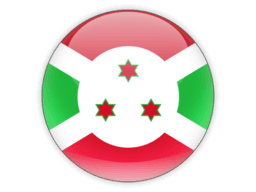
Cities of Burundi
Discover 23 cities across 18 regions
Bubanza(1)
Bujumbura Mairie(1)
Bujumbura Rural(3)
Bururi(1)
Cankuzo(1)
Cibitoke(1)
Gitega(1)
Karuzi(1)
Kayanza(1)
Muramvya(1)
Muyinga(1)
Mwaro(1)
Ngozi(1)
Rumonge(1)
Rutana(1)
Ruyigi(1)
Burundi is a landlocked country located in East Africa, bordered by Rwanda to the north, Tanzania to the east and south, and the Democratic Republic of the Congo to the west. The capital and largest city is Bujumbura, and the official languages are Kirundi and French.
Burundi's economy is primarily based on agriculture, with coffee being the country's most important export. Other important crops include tea, cotton, and maize. The country also has significant mineral resources, including nickel and gold. Burundi is one of the poorest countries in the world, and the government has undertaken significant economic and social reforms in recent years to address poverty and inequality.
Burundi has a rich cultural heritage, with more than 60 different ethnic groups and a variety of traditional music, dance, and art forms. The country is known for its drumming, and the royal drummers of Burundi are recognized worldwide for their skill.
Burundi is a presidential republic, with the president serving as both the head of state and government. The country has a multi-party system, but the political climate is often characterized by instability and violence. Burundi has a free press and a vibrant civil society, but human rights abuses and political violence continue to be major challenges.
Burundi has made progress in areas such as education and healthcare, but the country still faces many challenges, including poverty, food insecurity, and a lack of infrastructure. Burundi is committed to addressing these issues, with a focus on promoting economic growth, expanding access to education and healthcare, and improving governance and human rights.
National holiday
Independence Day, 1 July (1962)
Telephone Code
257
Local Emergency Phone
Local numbers only
Vaccinations
An International Certificate of Vaccination for yellow fever is required for all travelers. See WHO recommendations.
Climate
Equatorial; high plateau with considerable altitude variation (772 m to 2,670 m above sea level); average annual temperature varies with altitude from 23 to 17°C but is generally moderate as the average altitude is about 1,700 m; average annual rainfall is about 150 cm; two wet seasons (February to May and September to November), and 2 dry seasons (June to August and December to January)
Currency (Code)
Burundian francs (BIF)
Electricity/Voltage/Plug Type(s)
220 V / 50 Hz / plug types(s): C, E
Major Languages
Kirundi, French, Swahili, English
Major Religions
Roman Catholic 62.1%, Protestant 23.9%, Muslim 2.5%
Potable Water
Opt for bottled water
International Driving Permit
Suggested
Road Driving Side
Right
Tourist Destinations
Bujumbura; Kigwena Natural Reserve; Gitega; Gishora; Mount Heha; Saga Beach; Chutes De La Kerera
Major Sports
Soccer, basketball, track and field
Cultural Practices
Dress is taken seriously, and therefore jeans, t- shirts, and running shoes are considered very casual and are only acceptable for outdoor activities and on weekends.
Tipping Guidelines
A 10% tip at restaurants is customary. Porters should be tipped a few francs. Tipping taxi drivers is not expected, but if the ride was pleasant you should round up. Tipping bartenders is not common.
Souvenirs
Wicker baskets, pottery, jewelry, leather goods, other native handicrafts
Traditional Cuisine
Boko Boko — a porridge made from shredded meat, bulghur or cracked wheat, and spices; sometimes flavored with sugar, honey, milk, or lemon juice
Geography
Area
total: 27,830 sq km
land: 25,680 sq km
water: 2,150 sq km
Climate
equatorial; high plateau with considerable altitude variation (772 m to 2,670 m above sea level); average annual temperature varies with altitude from 23 to 17 degrees Celsius but is generally moderate as the average altitude is about 1,700 m; average annual rainfall is about 150 cm; two wet seasons (February to May and September to November), and two dry seasons (June to August and December to January)
Natural resources
nickel, uranium, rare earth oxides, peat, cobalt, copper, platinum, vanadium, arable land, hydropower, niobium, tantalum, gold, tin, tungsten, kaolin, limestone
People and Society
Population
13,162,952 (2023 est.)
Ethnic groups
Hutu, Tutsi, Twa (Pygmy)
Languages
Kirundi only 29.7% (official); French only 0.3% (official); Swahili only 0.2%; English only 0.1% (official); Kirundi and French 8.4%; Kirundi, French, and English 2.4%, other language combinations 2%, unspecified 56.9% (2008 est.)
Religions
Roman Catholic 58.6%, Protestant 35.3% (includes Adventist 2.7% and other Protestant 32.6%), Muslim 3.4%, other 1.3%, none 1.3% (2016-17 est.)
Population growth rate
3.59% (2023 est.)
Government
Government type
presidential republic
Capital
name: Gitega (political capital), Bujumbura (commercial capital); note - in January 2019, the Burundian parliament voted to make Gitega the political capital of the country while Bujumbura would remain its economic capital; as of 2022, the government's move to Gitega remains incomplete
Economy
Economic overview
highly agrarian, low-income Sub-Saharan economy; declining foreign assistance; increasing fiscal insolvencies; dense and still growing population; COVID-19 weakened economic recovery and flipped two years of deflation
Real GDP (purchasing power parity)
$8.849 billion (2021 est.)
Real GDP per capita
$700 (2021 est.)
Agricultural products
cassava, bananas, sweet potatoes, plantains, beans, vegetables, potatoes, cashew nuts, maize, taro
Industries
light consumer goods (sugar, shoes, soap, beer); cement, assembly of imported components; public works construction; food processing (fruits)
Exports
$285.105 million (2018 est.)
Exports - partners
United Arab Emirates 50%, Democratic Republic of the Congo 7% (2019)
Exports - commodities
gold, coffee, tea, raw earth metal ores, wheat flours (2019)
Imports
$905.294 million (2018 est.)
Imports - partners
China 14%, Saudi Arabia 14%, India 9%, Kenya 7%, United Arab Emirates 7%, Tanzania 5%, Zambia 5% (2019)
Imports - commodities
refined petroleum, packaged medicines, cement, raw sugar, cars (2019)
International Airports in Burundi
Discover 1 major airports serving Burundi
Mark Burundi as Visited
Add Burundi to your personal travel map and track your journey around the world. Share your adventures and see your progress grow!